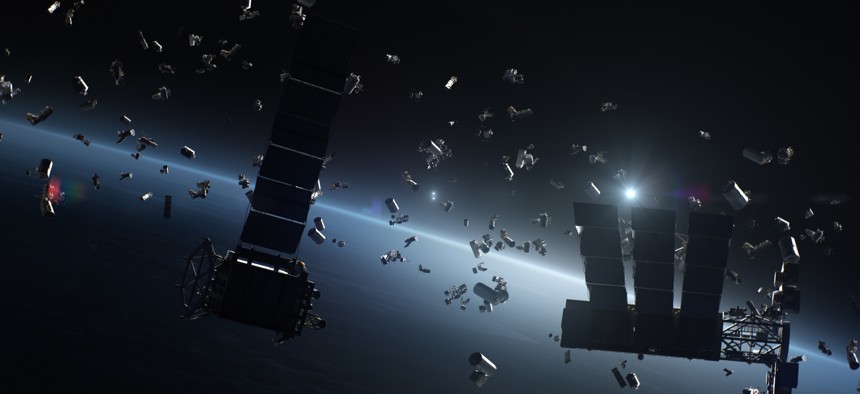NOAA Seeks Input on Future Space Situational Awareness Safety Services

3D Render of space debris around planet Earth EvgeniyShkolenko/Getty
The agency’s Office of Space Commerce seeks comment on its planned basic services and who should provide them as it looks to monitor satellites and orbital debris.
The National Oceanic and Atmospheric Administration’s Office of Space Commerce—or OSC—is looking for comments about the “scope of basic safety services for space situational awareness” for satellites and debris, according to a request for information filed last week.
As more objects like satellites orbit Earth and become decommissioned or non-functioning, the issue of orbital debris—or flying space junk—grows. Space situational awareness—which refers to detecting and tracking objects in space, while predicting their trajectory—is important for space operators to understand their environment and to prevent collisions.
According to the RFI, OSC’s basic space situational awareness services will be provided through the Traffic Management System for Space program, or TraCSS—which helps to avoid collisions in space. Specifically, as stated in the RFI, TraCSS “will provide satellite tracking data and associated products and services to support all private and civil space satellite owner/operators.” It will intake data to analyze in order to track orbital debris and other space objects.
As noted in the RFI, the agency is looking for comments regarding the starting operating capability and the basic safety services. Through TraCSS, OSC will provide basic space situational awareness services to further government interests of safety, stability and sustainability in space and increase American commercial space leadership.
According to the RFI, the scope of these services will be “limited to those necessary to maintain the safety, stability and sustainability of the increasingly congested and contested space environment.” However, there will be consideration for negative impacts on the U.S. space situational awareness industry. OSC noted that the line between basic safety services and advanced services will be determined based on needs and market dynamics, such as changing technologies.
OSC has outlined 14 planned basic space situational awareness safety services, such as:
- Maintain a database of satellite attributes, capabilities, status and point of contact.
- Receive predicted ephemerides—or space object trajectory table—from owners and operators, storing them in a way to make them available for interested parties to download and use as the main object for collision and risk assessments.
- Conduct routine collision assessment screenings and produce conjunction data messages for objects that violate the screenings.
- Do re-entry forecasting, management and assessment.
- Calculate the number of trackable debris fragments from a collision.
- Create a time-history plot of risk assessments.
- Provide warnings for space weather events and its effects on conjunction risk assessment parameters.
As a result, OSC will use the responses to help it create capabilities to share space situational awareness data and other important services to space operators and the public. OSC seeks comments on when a service is “basic” if it should be provided by the government or bought by the government from a commercial vendor and distributed to TraCSS users.
OSC is asking for public input on its definition of core U.S. Government interests in the provision of basic SSA safety services and its plan to meet those interests via TraCSS.
The agency has previously engaged in other space situational awareness efforts. OSC added that it has a relationship with the Defense Department regarding space situational awareness, space traffic management and the coordination of entities. Furthermore, OSC also has a pilot program giving spaceflight safety mission assurance to certain spacecraft in the medium Earth orbit and geostationary Earth orbit.
The most recent RFI comes after the agency previously sought software for space situational awareness programs and asked for information on commercial sensors and tracking for objects orbiting Earth.
Responses are due via email by Feb. 27.






